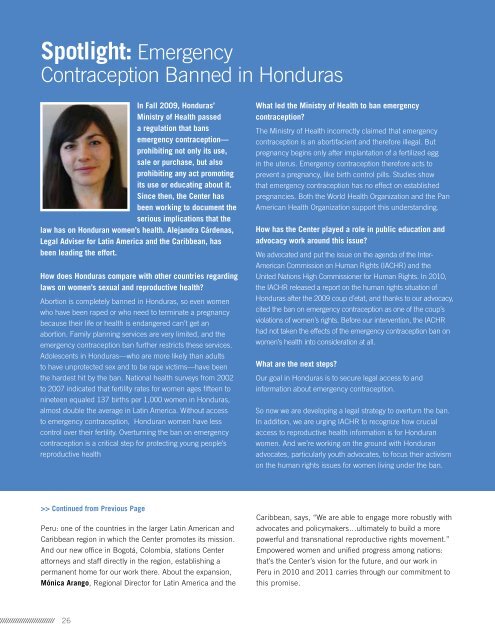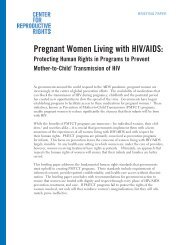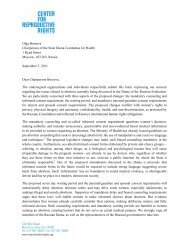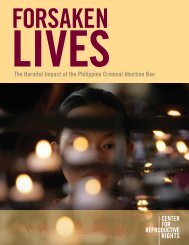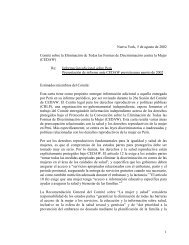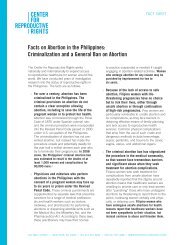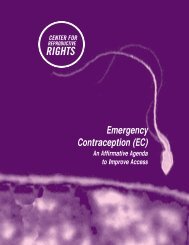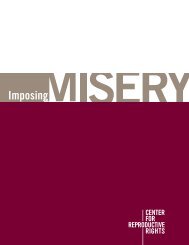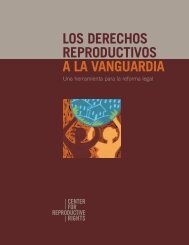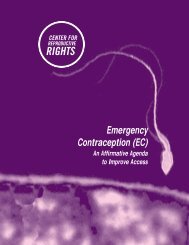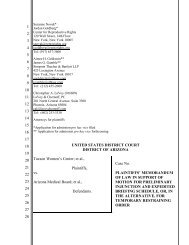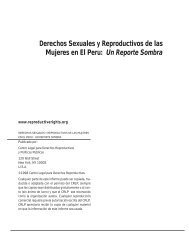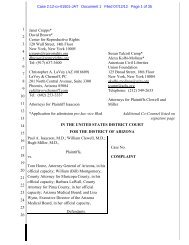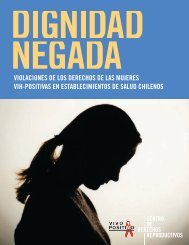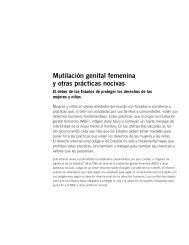Annual Report 2010-2011 - Center for Reproductive Rights
Annual Report 2010-2011 - Center for Reproductive Rights
Annual Report 2010-2011 - Center for Reproductive Rights
- No tags were found...
You also want an ePaper? Increase the reach of your titles
YUMPU automatically turns print PDFs into web optimized ePapers that Google loves.
Spotlight: EmergencyContraception Banned in HondurasIn Fall 2009, Honduras’Ministry of Health passeda regulation that bansemergency contraception—prohibiting not only its use,sale or purchase, but alsoprohibiting any act promotingits use or educating about it.Since then, the <strong>Center</strong> hasbeen working to document theserious implications that thelaw has on Honduran women’s health. Alejandra Cárdenas,Legal Adviser <strong>for</strong> Latin America and the Caribbean, hasbeen leading the ef<strong>for</strong>t.How does Honduras compare with other countries regardinglaws on women’s sexual and reproductive health?Abortion is completely banned in Honduras, so even womenwho have been raped or who need to terminate a pregnancybecause their life or health is endangered can’t get anabortion. Family planning services are very limited, and theemergency contraception ban further restricts these services.Adolescents in Honduras—who are more likely than adultsto have unprotected sex and to be rape victims—have beenthe hardest hit by the ban. National health surveys from 2002to 2007 indicated that fertility rates <strong>for</strong> women ages fifteen tonineteen equaled 137 births per 1,000 women in Honduras,almost double the average in Latin America. Without accessto emergency contraception, Honduran women have lesscontrol over their fertility. Overturning the ban on emergencycontraception is a critical step <strong>for</strong> protecting young people’sreproductive healthWhat led the Ministry of Health to ban emergencycontraception?The Ministry of Health incorrectly claimed that emergencycontraception is an abortifacient and there<strong>for</strong>e illegal. Butpregnancy begins only after implantation of a fertilized eggin the uterus. Emergency contraception there<strong>for</strong>e acts toprevent a pregnancy, like birth control pills. Studies showthat emergency contraception has no effect on establishedpregnancies. Both the World Health Organization and the PanAmerican Health Organization support this understanding.How has the <strong>Center</strong> played a role in public education andadvocacy work around this issue?We advocated and put the issue on the agenda of the Inter-American Commission on Human <strong>Rights</strong> (IACHR) and theUnited Nations High Commissioner <strong>for</strong> Human <strong>Rights</strong>. In <strong>2010</strong>,the IACHR released a report on the human rights situation ofHonduras after the 2009 coup d’etat, and thanks to our advocacy,cited the ban on emergency contraception as one of the coup’sviolations of women’s rights. Be<strong>for</strong>e our intervention, the IACHRhad not taken the effects of the emergency contraception ban onwomen’s health into consideration at all.What are the next steps?Our goal in Honduras is to secure legal access to andin<strong>for</strong>mation about emergency contraception.So now we are developing a legal strategy to overturn the ban.In addition, we are urging IACHR to recognize how crucialaccess to reproductive health in<strong>for</strong>mation is <strong>for</strong> Honduranwomen. And we’re working on the ground with Honduranadvocates, particularly youth advocates, to focus their activismon the human rights issues <strong>for</strong> women living under the ban.In Costa Rica: OvercomingBarriers to In-Vitro FertilizationThe pain of yearning is a gnawing pain.For those women who desire childrenbut face challenges to bear them, feelingsof helplessness can be real barriers totheir happiness.<strong>Reproductive</strong> technologies like in-vitro fertilization (IVF) havehelped many women all over the world have the childrenthey want. To undergo IVF is a choice decided upon bywomen with their doctors, and it’s a protected human right.But <strong>for</strong> over a decade, women in Costa Rica who strugglewith conceiving a child are closed off to this route altogether,as the Constitutional Court has wholly prohibited IVF, andhave there<strong>for</strong>e denied these women this means to pursuetheir happiness.In 2000, the Costa Rican Constitutional Chamber ruled thatIVF was unconstitutional, holding that human life begins atconception, and that from that point on an embryo is entitledto the protection of the law just as any person. (By nature ofthe IVF process, some fertilized eggs or embryos may die,as is also the case in unassisted reproduction.) The <strong>Center</strong>first responded to this policy in 2004, when it filed an amicusbrief in a case taken to the Inter-American Commission onHuman <strong>Rights</strong> (IACHR) filed by ten Costa Rican couples anda fertility clinic. Our brief asserts that the ban conflicts withthe government’s human rights obligations and standards. InAugust <strong>2010</strong>, the IACHR issued a decision, establishing thatthe ban violated the right to be free from arbitrary interferencewith one’s private life, the right to found a family, and women’sright to equality.legislators drafted a new law that would legalize the procedurebut make it inaccessible, <strong>for</strong>cing women to submit toenormous economic, emotional, psychological, and medicalburdens. Furthermore, the proposed regulations actuallyalter the procedure—another case of politicians hijackingmedicine—and make it potentially harmful to women’shealth. In November <strong>2010</strong>, the <strong>Center</strong> co-drafted a letter withColectiva por el Derecho a Decidir to the IACHR stating theseconcerns. We also joined a petition by over fifty Costa Rican,regional, and international organizations that called attention tothis egregious draft law.Beginning in <strong>2011</strong> and going <strong>for</strong>ward, we are working on jointadvocacy ef<strong>for</strong>ts with local partners to ensure that the IACHRdoes not accept Costa Rica’s legislative measures as being incompliance with its recommendations. Meanwhile, the IACHRhas granted the Costa Rican government an extension of timeto comply with the recommendations, at which time we willinitiate the next step in our strategy of making IVF available towomen who wish to use it.>> Continued from Previous PagePeru: one of the countries in the larger Latin American andCaribbean region in which the <strong>Center</strong> promotes its mission.And our new office in Bogotá, Colombia, stations <strong>Center</strong>attorneys and staff directly in the region, establishing apermanent home <strong>for</strong> our work there. About the expansion,Mónica Arango, Regional Director <strong>for</strong> Latin America and theCaribbean, says, “We are able to engage more robustly withadvocates and policymakers…ultimately to build a morepowerful and transnational reproductive rights movement.”Empowered women and unified progress among nations:that’s the <strong>Center</strong>’s vision <strong>for</strong> the future, and our work inPeru in <strong>2010</strong> and <strong>2011</strong> carries through our commitment tothis promise.Freedom and rights: precursors to happiness and health.The World Health Organization (WHO) defines health in theirconstitution as “a state of complete physical, mental, andsocial well-being and not merely the absence of disease orinfirmity” and states that “governments have a responsibility<strong>for</strong> the health of their peoples which can be fulfilled only by theprovision of adequate health and social measures.”Costa Rica’s government has not integrated the directrecommendations of the IACHR. Instead, Costa RicanThe <strong>Center</strong> envisions a time when the WHO’s definition ofhealth is recognized by governments worldwide and includeswomen’s reproductive freedom. Health and happiness are onlytruly fulfilled in combination with one another; it is fundamentalthat everyone be given the freedom to pursue those ends. Tosome degree we must accept life’s limitations, but arbitrarygovernment interference is not acceptable. And so the <strong>Center</strong>presses on in its fight in Costa Rica and elsewhere around theworld, where cultural attitudes and government policies willvary, but foundational human rights must be fixed.26 27 center <strong>for</strong> reproductive rights


